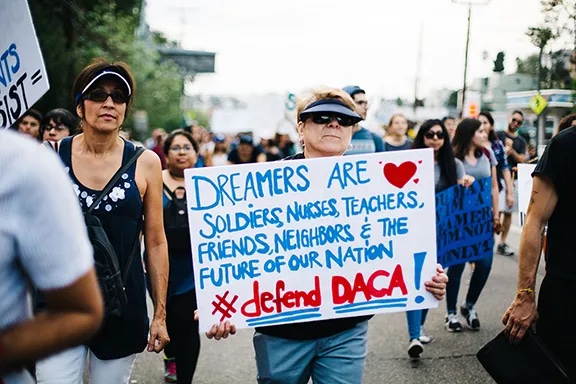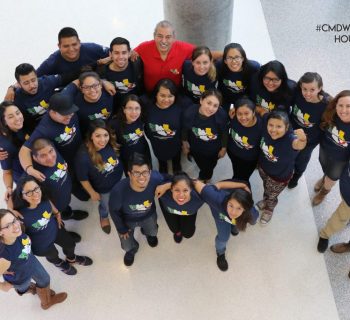FWD Staff Writer | FWD.us | Feb. 8th, 2024 | Photo Courtesy of Molly Adams
If you own or work for a business that employs, or wants to employ, individuals who have Deferred Action for Childhood Arrivals (DACA), there are steps that you may be able to take to help some of your DACA employees secure their immigration status.
This guide outlines five ways to support current and potential employees with DACA, like sponsoring them for a visa or helping them access immigration services. We strongly suggest that all DACA recipients receive a legal consultation to determine the best path for them to move forward and how their employer may be able to support them.
For more than a decade, DACA has provided temporary protection from deportation and authorization to work to hundreds of thousands of Dreamers, undocumented immigrants who came to the United States at a young age. However, DACA faces dire legal threats that could lead the Supreme Court to strip DACA recipients of their protections and work authorizations within the next two years. If DACA ends, the 580,000 current DACA recipients will be forced out of their jobs and be exposed to the threat of deportation.
DACA recipients need your help now. As an employer, you are in a unique position to support your DACA employees.
1. Sponsor employment-based visas
You may be able to sponsor a current or potential employee with DACA for an employment-based green card or temporary work permit. A green card, or “immigrant visa,” offers permanent legal status and a pathway to citizenship; a “nonimmigrant visa” offers only temporary protections, but could open options to adjust to a permanent status in the future.
DACA recipients have temporary permission to remain in the U.S. and work. However, if an individual is not able to renew their DACA, or if the program is ended, they will no longer be allowed to work in the United States, and they may be subject to forced removal.
The best solution is to help DACA recipients access more stable legal protections using existing pathways that don’t depend on a “fix” from Congress. Sponsoring an employee for legal status can provide certainty that they can continue working legally without disruption. It can also open the door to important benefits and opportunities, like being able to travel abroad for work or pleasure, not having to renew their work authorization every two years, and having a more stable, certain future.
Depending on the employee’s occupation, skills, education, and immigration history, they could qualify for one of many employment-based immigration categories. Two of the most common are a green card through “labor certification,” which can be done for any full-time job without a fixed end date, regardless of the field. Another possibility is a temporary work visa, which grants work authorization and legal status for a limited period of time. Some common examples include the H-1B visa for jobs requiring a specific degree in a specific field (like a teacher with an education degree or someone working in a STEM field), a TN “NAFTA professional” visa (for Canadian and Mexican nationals working in certain industries), or the O-1 “extraordinary ability” visa.
It is important to emphasize that an individual’s immigration history—including how they came to the U.S. and how long they remained unauthorized—may preclude them from accessing certain avenues. Some of these visa programs have strict annual numerical limits and complicated application procedures. A legal consultation with a qualified attorney is necessary to determine the best available options.
2. Provide and sponsor opportunities for Advance Parole
You can help employees with DACA access a pathway to permanent status by helping them travel on Advance Parole (AP).
Advance Parole allows DACA recipients to travel temporarily outside the United States and reenter lawfully with permission from the U.S. government. AP can be granted for urgent humanitarian reasons, like visiting a relative who is sick, or for employment or education purposes that would provide significant public benefit.
Advance Parole can help certain DACA recipients in their immigration processes. Many DACA recipients have an immediate family member, like a U.S. citizen spouse, who could sponsor them for a family-based green card. However, if a DACA recipient originally entered the U.S. without lawfully being processed at a port of entry, they cannot adjust their status from within the U.S. Traveling on Advance Parole resolves this problem because they will reenter the U.S. through a legal channel, allowing them to complete the family-based sponsorship process. (Securing an employment-based green card would require additional steps).
Your company can provide AP opportunities like sending a DACA employee to visit an international business site or to attend a training or conference. You can also support an employee’s Advance Parole travel by providing legal support or reimbursing their application fee, regardless of the reason for their travel.
For more information, see our Guide on Advance Parole in a Business Setting.
3. Provide access to legal consultations and other immigration services
A legal consultation with a knowledgeable and qualified lawyer can help DACA recipients and other immigrants discover if they are already eligible for an immigration benefit or pathway to legal status that they might not have considered or been aware of, and will determine what steps are needed to access any available pathways and protect against unintended legal consequences.
For individual employees, seeking legal help can be cost-prohibitive, especially for immigrants who have additional obligations like supporting their families. And it can be difficult to find trustworthy legal help; immigrants are often taken advantage of by notarios or “consultants,” whose inaccurate advice can lead to more severe legal consequences for the clients.
You can connect employees to reputable legal service providers so they can receive legal consultations. You can also offer your employees reimbursements for immigration-related consultations and services, including filing to renew their DACA status, which currently costs $495 (increasing to $555 for online applications and $605 for paper applications starting April 1, 2024) and must be done every two years.
4. Educate your human resources staff and other support teams on immigration issues and opportunities
You can help DACA recipients and other immigrant employees by ensuring that your human resources and other support teams are properly educated about the immigration system in general, and the specifics of the DACA program, and are aware of resources and opportunities to share with employees.
Immigration law is incredibly complex, and team members in human resources, global mobility, or employment law might not have experience with immigrant sponsorship or the particularities of DACA cases. It is important for these staff members to understand, for example, that employment-based immigration sponsorship or traveling abroad with Advance Parole or are possibilities for DACA recipients.
Employees should always receive individual advice from a qualified legal professional, but your team can help provide much more support, resources, and direction if they better understand the situations DACA recipients are working in and what their options might be.
5. Ask the Biden administration and your member of Congress to support permanent protections for Dreamers
You can support DACA recipients and their families by calling on your member of Congress, as well as the Biden administration, to take action to protect DACA recipients and Dreamers.
The recommendations in this guide could make a huge difference in the lives of DACA recipients in your workplace. Still, unless our elected leaders act, hundreds of thousands of DACA recipients and Dreamers will continue to live every day in uncertainty and fear. And if the Supreme Court ends DACA, an estimated 1,000 DACA recipients would be forced out of their jobs each week.
As a business owner and job creator, your voice is important and influential, and you can support your employees and your community by speaking up on their behalf.
We ask you to join us in urging the Biden administration to produce a “Dreamer protection plan” to support DACA recipients once the program ends. You can also contact your representatives in Congress and demand they work together to pass legislation that provides permanent protections and an opportunity for Dreamers to pursue citizenship.
By taking the steps outlined in this guide, you can help your employees feel more stable and secure, and be a model for other DACA employers, so that DACA recipients and Dreamers can continue contributing to the United States and building their futures in the country they call home.
If you want to learn more about opportunities like these, fill out the form below, and a FWD.us team member will reach out soon with more information.






